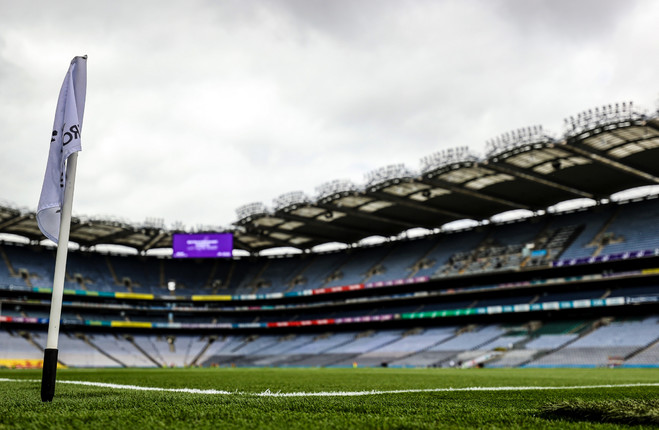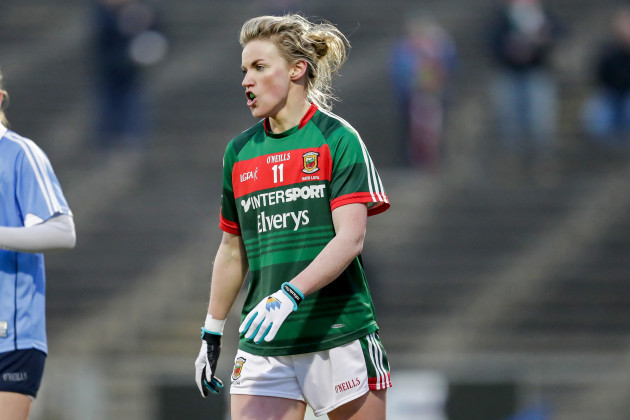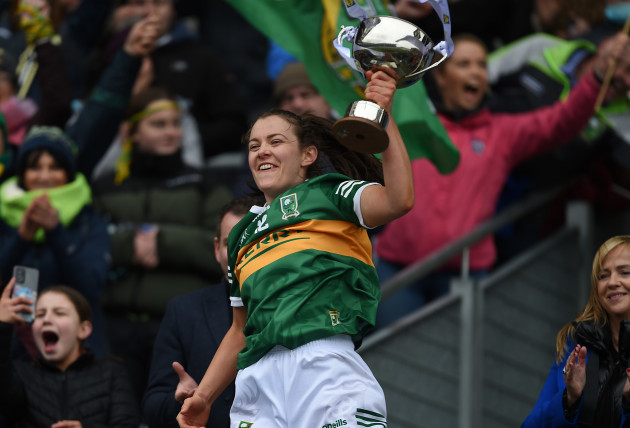PLAYING GAELIC GAMES at inter-county level is costing players an average of €1450 per month, according to findings collected by the GPA surveying seven players.
Following a request from The42, the GPA contacted its members to request for players to track their expenses on a weekly basis in a diary over the course of a month. The request was made on the back of an expenses dispute between the GAA and GPA, which recently ended with the agreement on a players’ charter for the 2022 season.
Seven players across Gaelic Football, Ladies Football, and camogie volunteered for this exercise, including one dual player. All costs related to their inter-county commitments were accounted for in the diaries, including money spent on fuel/travel, nutrition and medical/recovery expenses.
The male players have requested to keep their names anonymous but are playing for Laois, [commutes from Dublin] Kildare [commutes from north Dublin] and Roscommon [commutes from Dublin to Athlone IT and Kinnegad - Roscommon training venues].
The female players are:
- Fiona McHale [Mayo LGFA] – Lives in Templemore, Tipperary, and commutes to the Mayo Centre of Excellence in Bekan.
- Anna Galvin [Kerry LGFA] – Lives in Dublin and commutes to Kerry. Hires a pod in Limerick for remote working one day per week to facilitate commute.
- Siobhán McGrath [Galway camogie] – Lives in Limerick – studying in UL – and commutes to Galway.
- Libby Coppinger [Cork dual player] – Lives in Coomhala, West Cork, and splits time between home and Cork city for work.
The figure of €1,450 quoted above is an average based on the total amount spent by all seven players. (Actual average is €1,456 but has been rounded up).
Kerry’s Anna Galvin and Fiona McHale of Mayo recorded the highest monthly totals of €1,792 and €1,512 respectively. One of the male footballers clocked up €1,630 in expenses.
The mileage costs were the most expensive for all players involved, with McHale spending €1,210 on fuel while Galvin’s total for the month was €1,577. The male players were reimbursed for their travel expenses while the female players were not reimbursed for any expenses.
All of the players tracked the number of hours they spent commuting for their inter-county teams. Cork’s Coppinger had the biggest tally here, with 45 hours in one month which amounted to 1,865 miles. Galvin’s tally was 44 hours, while one of the male GAA players spent 31 hours commuting on the road.
The total number of hours spent on the roads for all seven players in one month was 240, which is an average of 34 hours in one month. The total distance covered by all seven players was 11,801 miles.
Nutrition also accounted for a high proportion of the monthly expenses, with one of the male players returning a total of €560 in his diary. Coppinger spent €280.
Galway camogie star Siobhán McGrath suffered a foot fracture recently which required two trips to Dublin for a meeting with a consultant and an MRI scan. The consultant fee was paid up front but can be claimed back at a later date. There were four physio appointments costing €55 each which can also be claimed back.
The injury forced her to miss work for two weeks, which resulted in a loss of €1,000. McGrath does not drive and relies on taxis for transportation to training which cost €15, along with bus fare that comes to €9.
Speaking to The42 about the contents of her diary, Galvin says she was shocked to discover how much she was spending on her inter-county commitments:
“Even as I was tracking it, I was thinking that this is definitely adding up to a very significant amount. I hadn’t totted up and I suppose ignorance was bliss to me. That’s how I’ve been going the last couple of years. It’s quite shocking.
“It is a huge amount of money and it was just a really expensive insight into what it costs to play but I just tried to think about the huge positives of what I’m getting out of it and try not to focus too much on the money. You have to keep going and not get too bogged down on it but it is startling.”
Galvin’s commute came to 44 hours between Dublin and Kerry, something which the Kingdom midfielder is conscious of being safe on the roads.
“It is pretty exhausting but I don’t mind driving and I can manage it. You’re getting back up to Dublin at 12.30am and not getting to bed until 1am, and then getting up in the morning. You’re sitting at a desk and your back is wrecked. It definitely takes its toll and you’re getting out of the car to do a training session.
“I take my time on the roads because I spend too much time on the roads to be flying up and down. I take my naps when I need to and would literally be pulling over on the side of the road to sleep. There have been times where I’m thinking that I could go to sleep there were times where I maybe tried to push through but you have to be smart.
“I just stop when I need to and carry on then.”
At this year’s Annual GAA Congress, a motion to prioritise the integration of the GAA with the Ladies Gaelic Football Association and the Camogie Association was passed by an overwhelming margin. Galvin says that constructive action must follow to address the high cost involved in playing at inter-county level.
“We voted for integration and that’s brilliant but realistically, I don’t know what action has gone on since then. What positive steps towards that integration has actually occurred? We need action to follow. That’s the best solution: a genuine effort to make integration happen in a reasonable timeframe. We can’t be waiting five years for this to happen.
“It’s just not sustainable for Ladies Football or camogie players to maintain that financial input without getting any sort of support. If the LGFA and Camgoie Association could support us in the interim, that would be huge. We need an outline of what the timeline is for the overall integration.”
The42 has reached out to the GAA, LGFA and Camogie Association for comment. A spokesperson for the Camogie Association responded to say that the GAA would be better placed to give a response on this matter.
No statement was received from the GAA at time of publication.
A statement from the LGFA reads:
“The Ladies Gaelic Football Association, Camogie Association and the Women’s Gaelic Players Association, now GPA, were aware of the further recognition and support required for intercounty players and submitted proposals to the Government for funding for a support scheme, and in 2017 the first figure of €428,000 was awarded.
“Every annual submission since then has requested an increase to funding, in particular the addition of a new area for player travel expenses included in the 2019 submission, as one of the core areas of allocation.
“In 2021 the player expenses element was approved by the Government for the first time increasing the support scheme from €700,000 to €2.4m. This has been a welcome addition and the annual growth of the figures show increasing recognition of intercounty players at government level also.
“The funding provided was never requested to fully reimburse players, or county boards through the team funding element, but to enhance the playing experience of all women who play the sports at the highest grade available in their county. The female element of the Government support scheme has areas for team funding – to enhance that playing environment, player health screening and player expenses.
“It is essential that we recognise the rapid growth in this funding over a short period but in line with that the hugely positive impact it has had on all teams and players. Up until 2017, there was no support available and players gave their all for their county jersey, as they continue to do, but the LGFA, Camogie Association, GAA and GPA now work collectively on this Government Support Scheme Funding on a joint working group and will strive to build on these solid structures for the coming years.
“We should also point out that we are not a professional sporting organisation, and that playing our sport is very much a matter of choice.”
The42 is on Instagram! Tap the button below on your phone to follow us!



